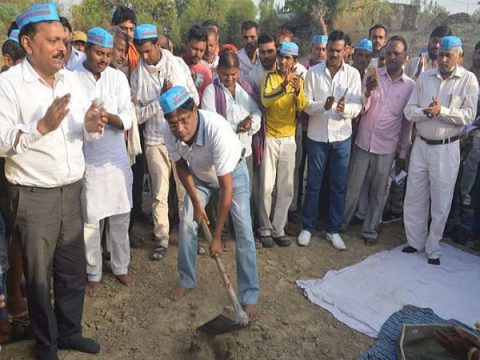
In a bid to fight the water crisis of Banda, Uttar Pradesh, District Magistrate Heera Lal has launched a campaign to conserve and revive water bodies including ponds and wells. The district perennially suffers from water scarcity, hampering the lives of the citizens.
The tagline of the campaign is ‘Kuwon-Talabo me paani layenge, Banda ko khushhaal banayenge’ (we will revive the wells and ponds and make Banda prosperous). The objective of the campaign is to improve the ground water level and save potable water. The District Magistrate has appealed the farmers, “Farmers with more than five acre land must build their own pond to irrigate their farms.” This step would help save and recycle water.
DM Heera Lal mentions that under the Banda Khet-Talaw Yojna, in the fiscal year 2019-20, as many as 2500 ponds are slated to be built. These ponds would be machine-built, meant to store the rainwater for harvesting agricultural farms.
As per the mandates stated by the administrative body, the ponds should be located in the recharge zone. There should be regular cleaning of the ponds and the inlet of the pond has to be constructed in such a way that soil or other particles do not get mixed with the water.
The height of the pond should be at least one foot higher than the maximum water level. There should be at least three inlets in the ponds and the ponds should be cleaned every two to three years.
For the restoration of wells, the primary step is to clean the well, even if it is not in use. DM Heera Lal mentions, “Wells and their surroundings should be cleaned in every two to three months. The base of the wells should be elevated.” The guidelines also state that there should be a shade on the well in order to avoid the water to get contaminated. Also, regular chores like cleaning, washing, feeding domestic animals should be done away from the wells.
Talking about the significance of the campaign, A K Singh, Deputy Director Agriculture, Banda says, “In order to secure our present and future, we must rejuvenate and revive ponds and wells in a collective way. There has to be collective and continuous effort in order to achieve this.”
Prior to launching the campaign, the DM had also inspected several wells of the city along with the Jal Sansthan and Nagar Palika authorities.
Leveraging Rain Water Harvesting to curb water shortage
According to Heera Lal, the average rainfall in the Bundelkhand district is 902 milimetre, which is higher than that of Punjab and Haryana, which is 636 milimetre and 563 milimetre respectively. The reason why the other two states could tackle the water crisis despite low rainfall is rainwater harvesting.
“Owing to lack of proper infrastructure, a large portion of rain water flows away untilised, which, if stored and treated, can solve the water crisis to some extent,” Heera Lal said.
The DM has suggested Shaft Digging near well or hand pump to conserve the rain water. “Even trees help us store and conserve water. Hence, plant as many trees as possible in your vicinity,” he said.
Sharing further details about the initiatives to conserve water in Banda, Heera Lal stated, “On one hand we are building check dams, small and big ponds to conserve water and on the other hand we are using irrigation techniques like drip and sprinkler irrigation to ensure that less water is used for irrigation.”
Accolades received by Banda DM for the initiative
The initiative taken by Banda DM Heera Lal has been awarded in the Water Project category of the Smart Cities India Awards 2019. The award ceremony was held on May 24, 2019 in New Delhi. On receiving the award, Heera Lal has congratulated the people involved in this campaign and has appealed that now focus on the revival of wells and ponds in the next phase of this campaign and save them from the water crisis by saving them alive. He said that bigger works can also be done easily with public participation, so we are confident of this campaign.
Accomplishments of the previous initiatives
Talking about the accomplishments of the water conservation initiatives implemented earlier, Heera Lal said, “We have constructed shafts to enable the storage of 3,930 kilolitres of water, of which 1,10,001 kilolitres water can be stored at the ground level.”
He added, “We also need to change our approach towards utilizing water resources as we can earn money but it is very difficult to earn water. There is a need to prepare a water security plan and water budget to assess the availability and the rate with which to spend this important resource.”
RELATED ITEMS:DM HEERA LAL, EGOV MAGAZINE, URBAN DEVELOPMENT, WATER CRISIS
